Related Research Articles

Berthe Marie Pauline Morisot was a French painter and a member of the circle of painters in Paris who became known as the Impressionists.
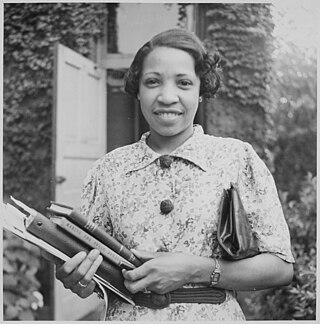
Lois Mailou Jones (1905–1998) was an artist and educator. Her work can be found in the collections of the Smithsonian American Art Museum, The Metropolitan Museum of Art, the National Museum of Women in the Arts, the Brooklyn Museum, the Museum of Fine Arts, Boston, Muscarelle Museum of Art, and The Phillips Collection. She is often associated with the Harlem Renaissance.

Anna Julia Haywood Cooper was an American author, educator, sociologist, speaker, Black liberation activist, and one of the most prominent African-American scholars in United States history.

Enolia Pettigen McMillan was an American educator, civil rights activist, and community leader and the first female national president of the NAACP.

Elizabeth Nourse was a realist-style genre, portrait, and landscape painter born in Mt. Healthy, Ohio, in the Cincinnati area. She also worked in decorative painting and sculpture. Described by her contemporaries as "the first woman painter of America" and "the dean of American woman painters in France and one of the most eminent contemporary artists of her sex," Nourse was the first American woman to be voted into the Société Nationale des Beaux-Arts. She also had the honor of having one of her paintings purchased by the French government and included in the Luxembourg Museum's permanent collection. Nourse's style was described by Los Angeles critic Henry J. Seldis as a "forerunner of social realist painting." Some of Nourse's works are displayed at the Cincinnati Art Museum.

Sarah H. Meriwether Nutter was one of the original sixteen founders of Alpha Kappa Alpha Sorority, Incorporated, the first sorority founded by African-American women. As an educator, she worked in the profession considered most critical to the advancement of African-American citizens.

Margaret Flagg-Holmes was one of the sixteen founders of Alpha Kappa Alpha Sorority, Incorporated, at Howard University in Washington, DC. It was the first sorority founded by African-American women.
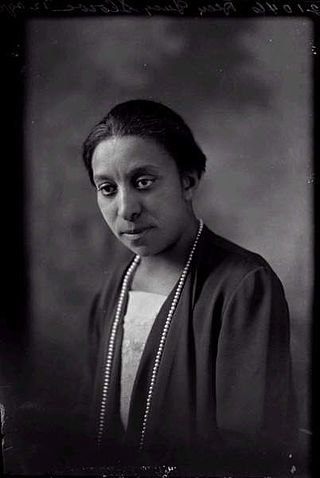
Lucy Diggs Slowe was an American educator and athlete, and the first Black woman to serve as Dean of Women at any American university. She was a founder of Alpha Kappa Alpha sorority, the first sorority founded by African-American women.

M Street High School, also known as Perry School, is a historic former school building located in the Northwest Quadrant of Washington, D.C. It has been listed on the District of Columbia Inventory of Historic Sites since 1978 and it was listed on the National Register of Historic Places in 1986. The building escaped demolition with community support and the efforts of preservationists and is now a community center.
Elma Johnson Stuckey (1907–1988) was an African American poet. Her poetry concerned the lives of black people from the days of slavery up through the late 1980s.
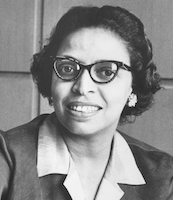
Doris E. Saunders was an American librarian, author, editor, businesswoman, and professor of Journalism. She started her career as Johnson Publishing Company librarian and then became head of the Johnson Publishing Company Books Division. Later in life, Saunders founded Ancestor Hunting, a genealogy research company, and wrote its publication, "Kith and Kin: Focus on Families." She was also Professor of Journalism and Chairwoman of the Department of Mass Communication at Jackson State University. After her retirement from Jackson State, Saunders continued to work with the Books Division at Johnson Publishing.
Bettye Collier-Thomas is a scholar of African-American women's history.

Yvonne Y. Clark was a pioneer for African-American and women engineers. Also known as Y.Y., she was the first woman to get a Bachelor of Science degree in mechanical engineering at Howard University, the first woman to earn a master's degree in Engineering Management from Vanderbilt University, and the first woman to serve as a faculty member in the College of Engineering and Technology at Tennessee State University, afterward becoming a professor emeritus.
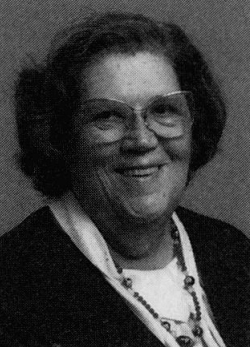
Ruth Smith Lloyd was a 20th-century scientist whose research focused on fertility, the relationship of sex hormones to growth, and the female sex cycle. She earned a PhD in the field of anatomy from Western Reserve University in 1941, making her the first African-American woman to have reached this achievement. Lloyd worked on the faculty of medicine at Howard University from 1942 to 1977. She married physician Sterling Morrison Lloyd in 1939, and they had three children: Marilyn, Sterling and David. She died of cancer in 1995.
Martha Bailey Briggs was an American educator who was born and educated in New Bedford, Massachusetts, where she taught formerly enslaved men and women to read and write. In 1869, she moved to Washington, D.C., where she taught and served as a principal at Anthony Bowen Elementary School until 1873, when she began work at Howard University. At Howard, she trained teachers and taught math. In 1879, she was hired to serve as principal of the Miner Normal School. She stepped down from Miner Normal in 1883 and returned to Howard, where she served as principal of the Howard Normal Department until her death in 1889.

Lula Vashti Turley Murphy was an American educator and community leader, one of the founding members of Delta Sigma Theta, the historically black sorority.

Vivian Mildred Bailey was an American World War II veteran, civil servant, and volunteer. She was a fundraiser for education, health, and military service personnel. Bailey was one of the first African American officers in the Women's Army Corps and served as a commander of the Women's Colored Detachment. Bailey was a division director in the Social Security Administration.

Eva Lois Allmon Evans was an American educator based in Lansing, Michigan, and the 24th international president of the Alpha Kappa Alpha sorority. She was inducted into the Michigan Women's Hall of Fame in 2005.
Mary Elizabeth Branch was an educator who served as president of Tillotson College. She helped it grow and develop. A Black American female, she was an influential leader.
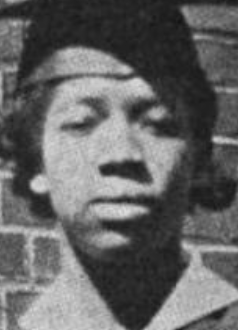
Elizabeth "Libby" Schmoke Randolph was an American educator. She was a leader on school desegregation in the Charlotte-Mecklenburg Schools in the 1970s, and president of the Association for Supervision and Curriculum Development, a national professional organization. She was also a regional director of Alpha Kappa Alpha. The Charlotte-Mecklenburg Schools administrative headquarters is named the Elizabeth Schmoke Randolph Building, in her memory.
References
- ↑ Stuckey, Sterling. "Cook, Vivian E. J." Oxford African American Studies Center. Retrieved 2 February 2021.
- 1 2 3 4 5 Onofrio, Jan (January 2000). Tennessee Biographical Dictionary. Somerset Publishers, Inc. pp. 207–209. ISBN 978-0-403-09700-5.
- 1 2 3 Murray, Dana (5 December 2017). "Vivian Cook: Educator and Activist". Black Artists in the Museum. Retrieved 2 February 2021.
- ↑ "Collecting at the BMA". Black Artists in the Museum. 17 November 2017. Retrieved 3 February 2021.
- ↑ Stuckey, Sterling (2000). Cook, Vivian E. J. (1889-1977), educator. doi:10.1093/anb/9780198606697.article.0901117. ISBN 978-0-19-860669-7 . Retrieved 2 February 2021.
{{cite book}}:|website=ignored (help) - ↑ Staff, MSRC (1 October 2015). "COOK, Vivian Johnson". Manuscript Division Finding Aids. Howard University. Retrieved 2 February 2021.